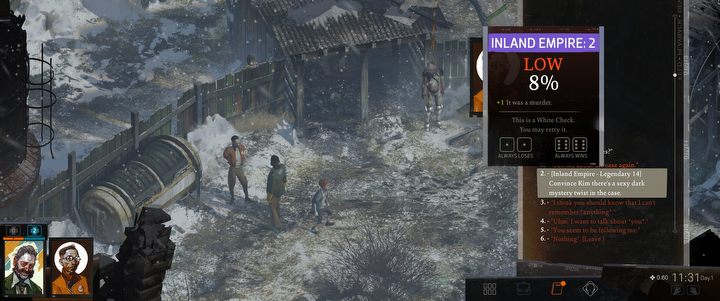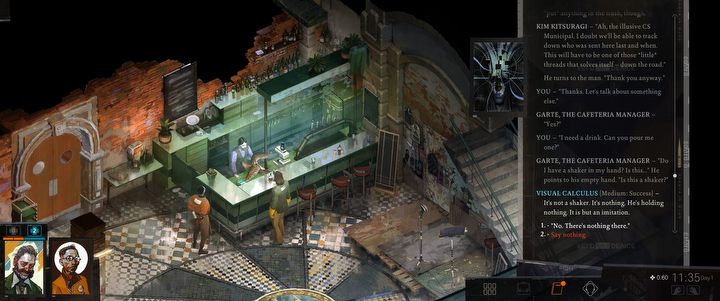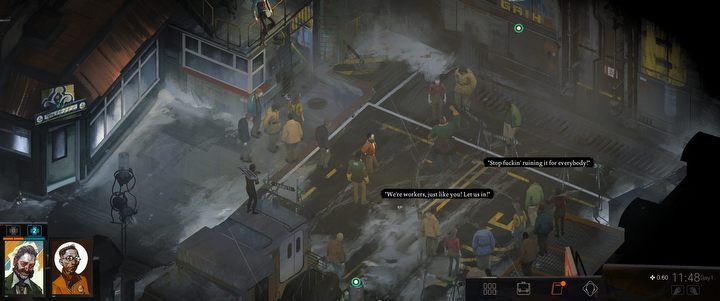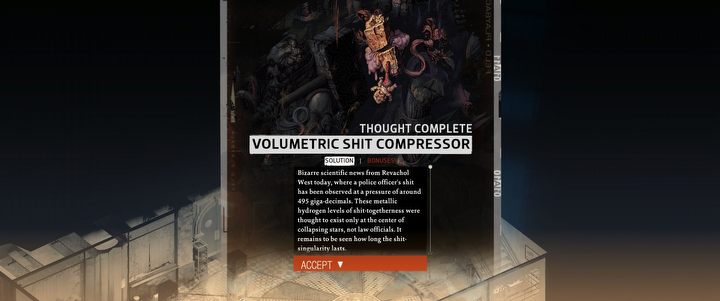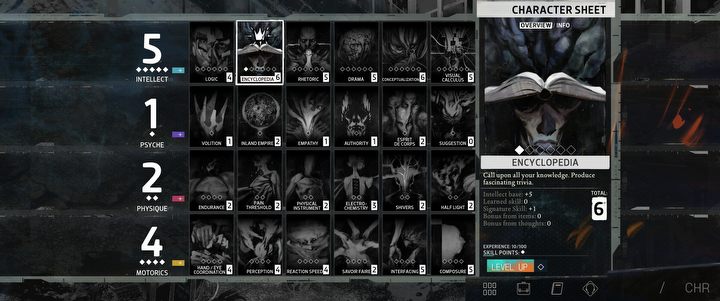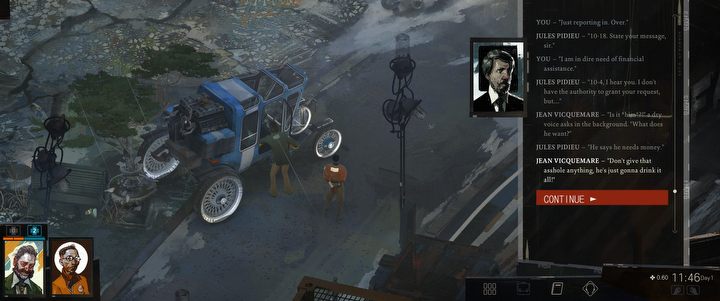Disco Elysium Has One of The Best Character Development Systems
Physical instrument rather than strength, hand-eye coordination rather than dexterity, conceptualization rather than intelligence – the skills in Disco Elysium are not something you get in every game, yet they're crucial to the game's success.
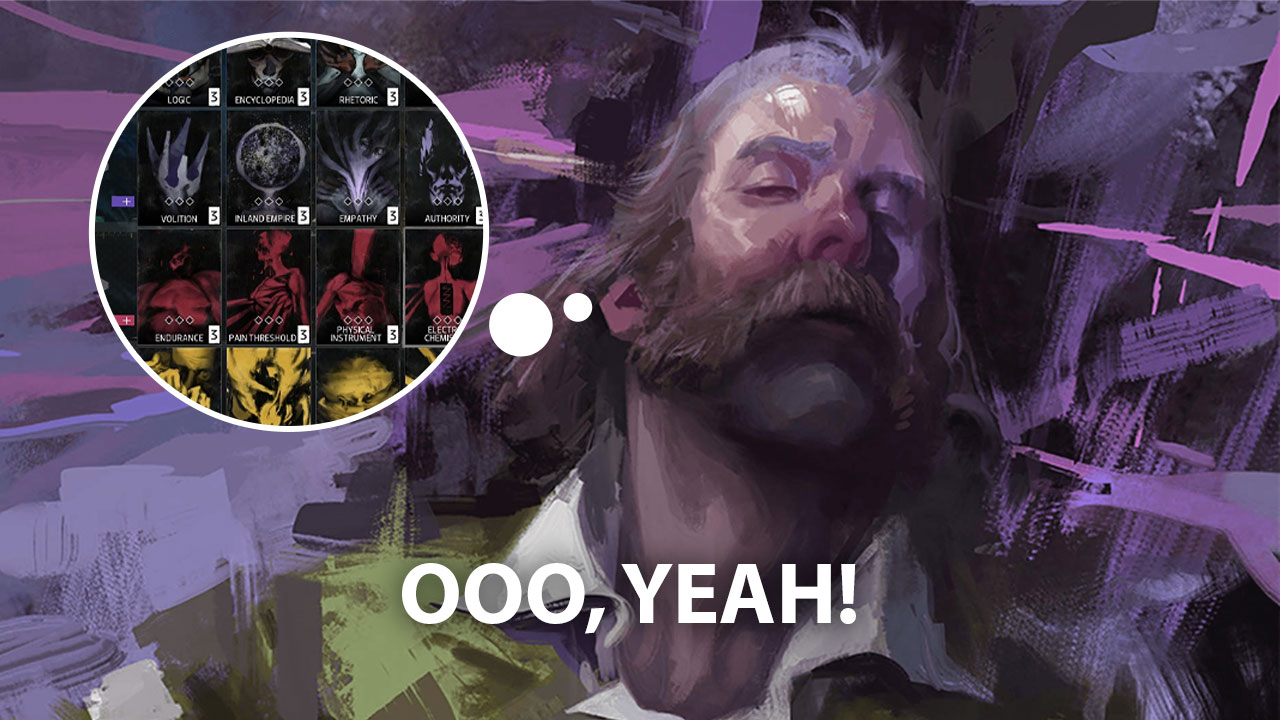
Disco Elysium is an excellent game in many respects. Many will say that its greatness is primarily in the complex, multi-layered story, combining a detective noire with a philosophical essay on rediscovering self. Others will focus on remarkable characters and witty dialogues. Others still will be enchanted by the artistic vision behind it, because the world created by ZA/UM is a surreal purgatory of a city.
I agree with all these opinions, but at the same time, I'd like to draw your attention to another small detail that makes a huge difference. Disco Elysium is an extremely clever game when it comes to the structure of the skill system and their impact on gameplay. We are talking about unconventional mechanics, a bit bizarre and, above all, totally fresh. In my view, these functions redefined the RPG genre, showing that all these perks, skills and other such elements are more than a cluster of numbers, percentages and statistics.
Character development is an inseparable element of every respectable RPG. Apart from a visiting locations, making choices and eliminating opponents, the player must influence the set of traits and skills of the avatar they control. Ever since Baldur's Gate, we've grown accustomed to the fact that after completing a few tasks and gaining the appropriate amount of experience, we can increase strength and dexterity, and still have a little more to spend on intelligence and charisma. These attributes make so much sense in describing characters that they've become a standard of the genre. It's perfectly clear for us which of them should be increased depending on whether we want to play a powerful warrior, a stealthy assassin, or a cunning mage, etc.
Disco Elysium doesn't completely turn these standards away, as we're still dealing with skills that can be expanded according to our choices with the currency of experience points earned by way of completing quests and exploring the world. It is not that revealing. The fun begins with the perks, because these (at least at first glance) seem ambiguous, opaque, somewhat pretentious – both semantically and functionally.
We'll take a look at a few of the 24 perks the game has. Take Inner Empire, for example, enabling daydreams and referring to the highly surreal film by David Lynch called... Inland Empire. The build of our character can also be based on Electrochemistry that enables drug trips and escape to the party planet. Then, there's a perk called Esprit de Corps, roughly translatable as "Cop spirit" – it's a sense of solidarity with the force, and intuition about how things work inside the Revachol Citizens Militia.
That all sounds very cool, but it's easy to feel kinda puzzled when building your character for the first time. I mean, what's that even all about? What's the best starting point? Are all of these equally useful? The best part is that these questions are addressed – by the game itself; in gameplay, in the story and setting. All the attributes available in Disco Elysium are literally the body and soul of the main character – they constitute both his emotions and physical responses; they're components that truly allow creating iterations of the protagonist that are completely different.
After less than an hour in the game, I started understanding who he is, and I indeed felt that this odd skilltree is a complete and full representation of his psyche and physicality. We first meet him on a massive hangover, slowly and painfully regaining consciousness in his undies, lying on the floor of a dirty, cluttered room with a broken window. The first words we hear in the game come from the Reptilian Brain, Du Bois' limbic system pondering over nothingness before realizing that "There's a head attached to my body, and I'm *inside it*" – and suddenly, it becomes clear what the Inland Empire is all about. Electrochemistry? Well, our protagonist is a drunk who's aware of his alcoholism, and also a man who enjoys taking drugs every now and then – we finally begin to understand that when he says "party planet," he means it. And as for Esprit de Corps, there is nothing complicated about it – the main character is simply a detective belonging to precinct 41. He's been a cop for most of his life.
The player discovers these dependencies step by step, gaining an increasing understanding what the chaotic constitution of the policeman controlled by them is all about, and what will be the preferred ways of expanding it. And the best part is what we can do with it. We can create a perfectionist artist able to see beauty where others see just plain reality; a self-pitying warm noodle, who only wants booze and amphetamine; a rude, strong and aggressive asshole who get's high first thing in the morning, or try to play a decent detective, struggling to stay this way. The game doesn't give us a character wizard, doesn't let us change sex or hair color, but at the same time provides an incredibly rich set of tools for creating a deep and complex character, that can be different with every playthrough. For me, this was an interesting experience, not only in terms of game mechanics, but also from a humanistic perspective. And that's not all.
The real potential of the solution is unleashed in the dialogues, which – let's face it – constitute about 70% of Disco Elysium's content – the rest just works as a purely visual narrative. Although this is not an RPG with turn-based combat or quick-time events, we undertake many different actions in it. All of these work as checks that can be either reattempted, or tried only once. The thing is that most of these activities are represented by walls of the text and a multitude of various dialogue options to choose from – and some lines come directly from the perks (elements of identity) themselves. You never know when an action as simple as opening a trashcan will turn into a philosophical debate about the condition of mankind – which happens entirely in the protagonist's head, with different parties involved, including the said trashcan.
It's an incredibly refreshing experience to be able to converse with the protagonist's own Logic or having Drama chime in with some dramatic observations. Believe me, this is the essence of this game's greatness. Disco Elysium shines so brightly precisely because every conversation can take place in many different ways. The shape of each conversation or internal monologue is actively influenced by the skills we've developed. Examples? Invest enough points into empathy, and you'll be able to see through people and ask them questions they never suspected you could infer. This allows you to understand the broader context of situations and unlock hidden dialogues, thus making more sensible decisions, saying sentences that are more appropriate and which will lead to better effects. There's a catch, though, however, and more than once I got caught.
What am I talking about? Let's take a certain conversation as an example. You can have with Kim, our partner. After a hard day's work, we go for a late-night chat over a cigarette, and the subject shifts, as is always the case, to politics. We discuss the principles behind a certain organization, and finally, the protagonist may ask – quit casually – about the symbol that this organization uses. A blue forget-me-not. My attributes (i.e. emotions) suddenly began to argue with each other about what they associate this flower with. Conceptualization linked it to kindness and ordinariness, the Internal Empire said it's more like malevolence, and Logic maintained it's all not very logical. One way or another, they all had three completely different perspectives and opinions.
The skill we develop aren't exclusively helpful: they can sometimes complicate things, confusing the hero's worldview. In this particular case, the emotions took the floor, disagreed with each other, but it didn't have much of an impact on the gameplay. However, there are moments when a specific decision must be made, and this will affect the further course of the game, and the attributes may express contradictory ideas. Then, you will not make a choice according to your own heart, because your heart is effectively divided into several, hostile camps. As annoying as it may seem, I took enormous satisfaction and joy from these internal arguments. For the first time in my entire history of gaming I have seen such a quirky and fun skill system. The points you invested can become moral hiccup, and your idea of building a character may backfire, creating a chaotic, confused mess of a man. In my first playthrough, I invested most points in Intelligence and Encyclopedia, hoping that additional knowledge will let me be a more keener, shrewder detective. To my surprise, I was assaulted by random bits of knowledge about stuff that very rarely pertained to the case, making my detective a cop that has a hard time putting reins on his intellect, end perhaps enjoys a memory that's a little too good and detailed.
I am well aware of how abstract and complicated it all can sound for those of you who haven't dealt with Disco Elysium yet (you should). This game is not only about veritable walls of text prepared for people who can digest poetic, philosophical and, above all, political elaborations; it's also about character development and mechanics related to it that constantly confuse us by exploring new possibilities when it comes to creating a hero and conducting dialogs. But this is also something completely different, completely fresh – Disco Elysium is simply not afraid to experiment.
I'm guessing that we will probably never get bored of RPGs, in which the most important thing is joyful exping and regular allocation of skill points – it's a nice thing, a tried solution, and I definitely enjoy nerding out over the stats window. But Disco Elysium made me realize that I took these classic RPG mechanics almost for granted, a stiff standard, something that's hard to live without. Turning these rules upside down and making them as weird as possible made me not only understand that it's possible to do it differently – it also made me realize that I want it to be different. And that's what I wish this Xmas – character development systems like that.
